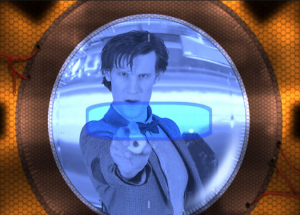
Let me begin with a confession. I do not watch the BBC scifi series Doctor Who regularly. After hearing colleagues rave about Doctor Who, I watched one episode that left me underwhelmed. We can make sense of the discrepancy between my response to Doctor Who and the responses of some of my colleagues through a comparison. Perhaps my limited mental acumen in comparison to these colleagues leaves me unable to appreciate fully the multiple levels on which they find Doctor Who intriguing. Perhaps the difference reflects my preference for more stimulating activities than passive consumption of mass media. Both comparisons, as attempts to organize difference, reflect the interests of whomever selects what elements are relevant to the comparison and what elements are not, specifically anything that undermines the desired organization of difference.
Watch Is Doctor Who a Religion? on PBS.
This PBS Idea Channel video from last year constructs a comparison to argue that Doctor Who can be viewed as a religion. To establish the standard of a religion against which he compares Doctor Who, the host Mike Rugnetta begins with what he already knows is religious, emphasizing other known religions (Hinduism, Buddhism, Bahai, etc.) whose conceptions and practices are not limited to churches and an anthropomorphic deity in the sky. Starting with those collections of beliefs and practices that someone already recognizes as a religion to define what is and is not a religion is not unique to media commentators but also appears in some academic efforts to define religion (e.g., disallowing any theistic definition of religion because some understandings of Buddhism are atheistic, and we know that counts as religion). The received, unquestioned wisdom of the discourse on religions, then, is not a divine revelation like the Qur’an or Bible but comes from the authoritative World Religions paradigm.
Efforts to expand the category, like this video does, attempt to challenge that received wisdom. The video references Clifford Geertz’s assertion of “a general order” and Emile Durkheim’s notion of effervescence to advance the comparison of Doctor Who to known religions. The clincher to the argument is that some fans report discovering in Doctor Who ethics and other conceptions to order their lives, as if anything that influences someone’s life must be a religion. Obviously, his comparison between Doctor Who and these known religions leaves out many elements.
The video then takes a twist. (starting at 4:41 in the video)
But what I do believe though is that the media that we consume, especially in 2012 oclock, double plus impacts are worldview, even more so than whatever actual religion, if any, you were raised with, unless you were raised Jedi.
The first curious point is Rugnetta’s fall back to “actual religion.” Even as he works to expand the category, the received wisdom that he is challenging persists unfazed. Does that make newly classified religions like Whovianism “pseudo-religions”? And we know the difference because the world religion textbook “tells me so”? The statement then reinforces the notion that religions (should?) influence people, implying that having pseudo-religions like Doctor Who influencing our lives is at least noteworthy, perhaps problematic or a sign of the decline of “actual religion.”
This effort comparing Doctor Who to religion may be particularly problematic, but it reflects what often happens in efforts to expand the category “religion.” Both scholars and commentators construct simplistic comparisons, often drawing on some standard assumptions, that highlight whatever fits the conclusion that they want to argue. The effort typically serves the purpose of maintaining religions as central to human existence. Unlike Doctor Who’s ability to traverse time and place, these comparisons remain rooted in the time and place of those constructing the comparison.
